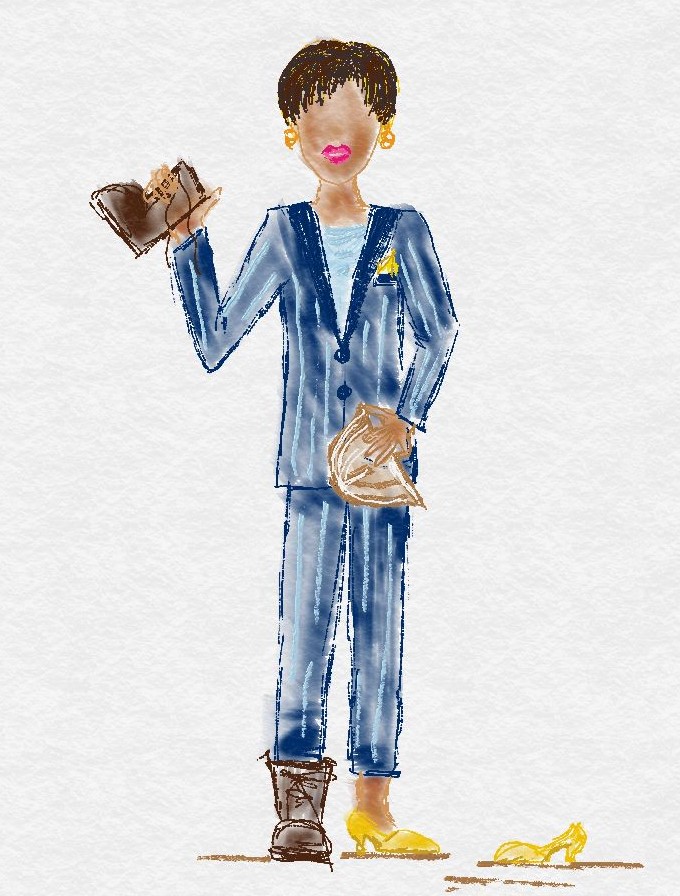Life Choices
What Time Are You Leaving?
How to Avoid Killing Your Colleagues

It’s Thursday afternoon at 3:50 PM. You’ve managed to end a phone call with a very talkative client who just happens to spend $3 trillion dollars with your firm every year. If you can make it out the door in the next 15 minutes, you’ll blow through the parkway before traffic gets bad, swing by the sitter to pick up the little kids, make it to the dry cleaner before they close, and have dinner on the table by 6:30, assuming the older kids didn’t eat the dinner ingredients when they got home from high school this afternoon. (Seriously – I can’t even count how many times I said over the years “You know where Kroger is. I suggest you get there and back VERY fast and replace what you just ate so the rest of us can have dinner. Who cooks ground beef as an after school snack?!”) If anyone delays you by even 10 minutes, you’ll sit in traffic for an eternity, have to pay a late fee at the sitter, the dry cleaners will be closed so you’ll have to wear your suit with the Gogurt stain on it for your big presentation tomorrow, and no one will eat dinner. Maybe ever. Are you getting tense just reading this? Did you check your watch? Drink some wine.
Back in our horror film scenario, just as you start to slip out your door, a familiar refrain can be heard from the next office door. “Leaving already? Wow. I never knew this was a bank.” Yes, it’s Carl. Carl is the engineer in the next office who has made it his life’s ambition to provide the public with a living history exhibit of a 1955 stereotypical male, cartoon-style. He sits down at his desk at 7:55 AM, he goes to lunch from noon to 1:00 PM at the same artery-clogging spot every day, he leaves at 5:05 PM, and he observes every little fragment of standard company protocol. He only knows that his kids wore diapers because he doesn’t trust his wife’s financial skills and checks over her purchases every week. He gets his oil changed every 3,000 miles because the manufacturer says to, and he enjoys halting construction projects so he can tell everyone involved that he’s “the engineer, and the engineer has the final word.” Carl is lucky no one has killed him.
Carl’s words burrow under your skin, even though this is the 3,712th time you have heard them. Seriously? Is he kidding? You haven’t slept in three years. You put in 60 hours last week, and a big chunk of it was when Carl was sleeping like a baby in his old man pajamas. You have an agreement with your boss. She said it was okay to leave now. She says your work is great. So why can’t you just shut the #$@% up, Carl?!
Actually, you mumble something about you wish it was a bank ha ha, and you sprint out the door. But Carl has ruined your afternoon. Again. And why? Does he really think you don’t belong here? Is he implying that your work is suffering because of your non-traditional hours? Is it suffering? Maybe the boss is just being nice. Maybe she’s been trying to find a way to tell you that you’re falling way behind. Maybe you never should have become an engineer. Maybe your kids and your husband think you’re a failure, too. Who were you kidding to think you could do all this?
(For the men in our audience, yes, this is how it really sounds in a woman’s head. It’s like a constant Hitchcock movie, in terms of tension).
On a calmer, saner note, let’s take a look at Carl. First, he’s an engineer, so chances are his personality really needs order and rules and consistency. Yours does, too, but there are ranges within every group. Carl happens to be at the psychotic end of the spectrum. In addition, who actually says something out loud to their co-worker about when she’s leaving, even if they’re speculating about it mentally? Is that Carl’s job? No. So that means that Carl is a meddlesome, arrogant, passive-aggressive control freak who constantly tries to compare others to himself so he can feel superior. In southern Indiana, they call that nibby. It’s not a good thing. So Carl is not such a great person, regardless of whether he’s a guy or a woman. Sexism is just one of the many negative attributes of his crappy personality.
Let’s go back to you. Do you have an agreement with your boss saying you can work this flexible schedule? Does she appear to be pleased with your work? Are you getting it done? Are you being sure to point out to your boss when you do things well so that it won’t get lost in the day-to-day fray? If the answers to these questions are yes, then what’s the problem?
Well, you say, the problem is that I’m sick of hearing Carl say these things, and I want him to leave me alone. As ideal as that may sound, life is truly just one long stretch of seventh grade. Carl has a personality problem, and it’s probably not going to change. And you’re going to work with a lot of other people who will have other personality problems, and they won’t change either. None of this has anything to do with your choices/position as a woman or as an engineer. This has everything to do with life being like seventh grade. The real lesson in life is learning to deal with the other seventh graders and developing enough confidence to believe in yourself.
It’s true, Carl is dreadfully annoying, as are the concrete guys who say every day, “Are you just getting up? I’ve been up since fill-in-the-blank.” These people have an insecurity and need to have a way to feel like they’re better than you. Just ignore Carl. No, he won’t go away. But you have lots of options to give it right back to him, if you choose to expend the energy. (If you do, be sure you are doing it for entertainment purposes only. You don’t need to lash out at Carl to prove your worth). You can say in your sweetest voice, “I KNOW! Isn’t it fabulous? I think I’ll go shopping!” Or you could send Carl e-mails every hour in the middle of the night, beginning each subsequent message with, “Well, I guess you’ve already gone to sleep. I’m glad someone gets to. Please try to respond whenever it is that you’ll be working again.” For a quieter offensive attack, you could just say, “Am I?” Is it?”
Carl’s sexism is just a symptom of his poor character, so don’t concentrate on the wrong disease. You won’t cure him with earnest talks about equality and opportunities.
For your part, you have to be very careful not to do the same thing Carl is doing. Maybe you think your job as a mom is very noble, and you comment to one of your friends that can you believe that new project manager gets to come in early on Fridays so he can leave at 2:00 PM to go backpacking every weekend? Here you are slaving away 23 hours a day, and this kid gets a flexible schedule so he can go play. No. You chose to have kids, just like he chooses to go backpacking. You can’t go getting outraged about others criticizing your choices and then attack someone else’s choices. It’s good for everyone or it’s good for no one. This isn’t The Handmaid’s Tale, and you aren’t being forced to breed. So tell that backpacker to send you some great photos of the Red River Gorge, and you’ll have your kids draw adorable sketches of mountains for him. Everyone will appreciate the variety of choice that is the spice of life, and you’ll all be in a better mood to get your work done. Except Carl. He’ll be too busy documenting for the boss how much time you and the backpacker spent talking, and he’ll make her a spreadsheet of lost productivity. Give your boss some of your wine – I guarantee you she needs it.
Toolbox Talk – The Dangers of Heat
Precautions for Heat Hazards

So, you did it. You slept with someone at work. Are you feeling liberated? Great. Hang onto that feeling, because it’s going to last for about another 14 seconds.
As women in a male-dominated field, we spend a lot of time talking about men who treat us badly or who make sexual remarks in the workplace. Obviously those situations are not desirable and they take away from the positive perceptions those around us have of our professional capabilities. But what happens when someone comes on to you and you accept? Isn’t it your right to decide how you respond to people in life? Didn’t a bunch of women in the 1960s and 1970s blaze a trail so that we could have the same sexual freedoms that men have? Maybe. But there is a yawning chasm of chaos between reality and idealism. It’s important to know the risks before you go rappelling.
In 1994, there was a watershed moment for the relationship between women and construction workers, and it involved diet Coke and a man named Lucky Vanous. There are a lot of women who still find meaning in the phrase, “It’s 11:30.” (If you don’t know what I’m talking about, do a YouTube search, but grab your drool towel before you start to watch). The idea that women could be the aggressor with a construction worker was revolutionary and went against the traditional stereotype.
For those of us in the industry, we were a bit amused at first, because the average construction worker is a little more Jack Black and a little less Chris Hemsworth. If you’re a 25-year-old female on a construction site, you absolutely can get 1,346 invitations and propositions a day (on average). Approximately 1,250 of those fall into the “Ewwww!” category, 52 are of the “Maybe if the world was about to end” variety, 31 can be summed up as “Yeah, IF YOU WEREN’T MARRIED,” 7 are cute but look like your brother, and 6 have potential. It’s those 6 that are dangerous. Three of the 6 are really hot and can be as deadly to your career as forgetting to design for lateral loads for a transmission tower next to a retirement home in Kansas. Someone is going to get squashed and someone is going to cry. Both might be you.
Let’s be clear – lots and lots of people find love at work. Lots of people find lust at work. Most women and men are aware of the pitfalls of lacing your latte with the company cream, so to speak. But sometimes it works, and sometimes that pair of big brown eyes you first see by the light of your oversized monitor will one day show up again on the face of your firstborn. HR will send a fruit basket and drink another double vodka, grateful that yet another potential lawsuit turned into a fairytale instead.
But you are not just another hexahedron in a cube farm with an adequate estrogen level. You are a female in a male-dominated industry, an X-chromosome in a sea of Ys. You struggle daily with getting the men around you to accept your intellect as equal to theirs. A huge part of your battle is getting those men to stop being distracted by the sexual part of your being. So what’s going to happen when someone finds out that the sexual part of your being is front and center at work?
The key to this discussion is realizing that most men (not all) will shift a woman into a mental category in order to perceive her as a competent colleague. Your older, wiser mentor? You occupy a “daughter” space in his mind. He’s so proud of you for being smart and dedicated, and he knows that a serious woman like you doesn’t trouble herself with sex. Or at least that’s what he tells himself so that his head doesn’t explode. Your fellow junior engineer who started at the firm when you did and weathered that ugly dam failure with you? He sees you as his “buddy,” sort of like his sister. He knows that you like boys, but he doesn’t want to think about it. Because the minute he thinks of you as someone who has sex, he can’t avoid thinking about that part of you when you’re working together. And then we’re back to distraction.
On a construction site, all of this is much more amplified. Despite the fact that this is 2017, construction sites still tend to be testosterone driven, with very traditional male roles and behaviors embraced as part of the culture. So the minute you walk out on the site, you are quarry to at least a portion of the men on the project. Some of the men will be convinced that you wouldn’t be out there if you didn’t want to have sex with all of them. Some will be appalled that a nice young lady like you is subjecting herself to such a rough environment every day. And some will be really cute. Just sayin’.
Your choice should be an informed one. This is not Fantasyland. Write that on your arm and repeat it to yourself often. Despite the fact that you should be able to go out with that adorable rodbuster and inspect his rebar if you so choose, there will be consequences. Some of the guys on the site will act disappointed in you. Others will take your actions as a free pass to make a pass. And still others will stop acting like you have any credibility. One piece of your being will eclipse all of the other parts for those men, and they will not be able to see all of the professional pieces they acknowledged before. It’s not fair, but it’s where we are. Two hundred years from now, 2017 will not be that time in history when life was equal for the sexes.
Your option for moving forward will be to keep doing your job and remind all of these men why they thought you were good at your profession to begin with. But this requires tenacity and a strong stomach. And you have to be committed to the cause. If you are sensitive or get upset easily when you are the center of attention, then don’t even go there. Look for your next squeeze at the smoothie bar or at your planned outing to the Renaissance Faire, and leave work at work.
Early in my career, I was working on a large construction site with hundreds of men. Two months in, I started hearing about the people I was sleeping with. It was very surprising, considering that I was working 80 hours a week and my social life consisted of watching the firefighters at the grocery on Sunday mornings. But the rumors persisted (and grew), despite my best efforts. One of the guys told me that no matter what I did to prove that I was a good engineer, I was still mostly a potential hookup to many of the guys out there. Finally fed up, I went in to our trailer at lunch one day and addressed what I was hearing. I told the guys that if they insisted on telling stories about me, at least make them interesting. I didn’t want it to be said I was having sex with one of the roofers, I wanted people to hear that I had sex with a roofer during the day shift on the roof. I told them whatever you do, don’t make me boring. Amazingly, the rumors stopped. Which only proved my theory that you have to have nerves of steel and the personality of a charging bull to weather this environment, even when you’re not doing anything. If you decide to actually do something, you’ll need to add a hide of heavy leather to that mix. It’s your decision, but you have to own it when you make it.
Maybe it will be better in 2073. Is it 11:30 yet? I’m thirsty.
Patterns for Success
Respond, don’t React
by Mia Painter, Guest Contributor

I was raised in a small family of women – mom, gram, two aunts, and a few cousins. My family had started out with some men, but the year I was two my grandfather and uncle died and my mom left my abusive father. I remember the women around me as strong, self-sufficient, generous, flexible, but only at times sensitive and outwardly loving. They all encouraged (and expected) me to do chores (lots of cleaning and mowing the lawn), to explore (keeping pet worms and having areas of the yard I could turn to mud factories), and to stand up for myself. Most importantly, I think, to who I am today – they expected me to do what I wanted to do, regardless of what those around me said. But here’s what I’ve been pondering lately…I think what I took from their lessons was to react, not to respond. My pattern of reaction (and not response) led me to where I am in my career. I’m (generally) happy with how my career has worked out but I wonder how it would have been had I responded more and reacted less. So now I’m starting to look at how I can respond to career situations and move forward with intention, not just reacting to situations with a gut reaction.
Reacting is what we instinctually or quickly do when an event or a decision or a confrontation happens. To me, reacting happens when I see something unjust or am exposed to a hard situation – and become angry or defensive or hurt. It also occurs when I see something as a challenge and charge forward to meet it head-on without much forethought.
Responding takes more effort and involves thinking things through. Responding means I keep my calm, think about what happened, and make an active, conscious decision about the best course of action (or inaction) to take. Responding isn’t always slower than reacting (though it certainly can be) but it is always about seeing a bigger and different perspective around the situation.
The most vivid memory of me reacting as a kid was in kindergarten (although it’s one of those memories that is now warped by my mom’s telling me about it so many times, so it’s a blend of my memory plus her story). It was free time and a boy (Brad) told me I couldn’t walk on the desks. Now maybe he meant that I shouldn’t, or that it wasn’t appropriate to stand on desks in school. But I heard him tell me I couldn’t do it and so I immediately took it as a challenge. I climbed up on the little kindergarten sized desks in my Catholic school jumper and walked around from desk to desk while the class looked at me in surprise. As you can expect, I was told to get down and to go to the principal’s office. My mom came to pick me up and asked what happened. I said Brad told me I couldn’t walk on desks and so I did. She told me good, that’s what I should have done! (And then followed it up with a discussion about appropriate times to walk on desks – i.e. not in class.)
Flash forward to college…end of my sophomore year and I had taken a variety of general classes but had not yet declared a major. My advisor told me I needed to pick a major now. I made my decision there and then in his office, and chose geology. Don’t get me wrong, geology is a good fit for me, but I didn’t do any long-term planning – I didn’t do any of the things I’d advise anyone who was choosing a career! I didn’t research options, would I need a master’s, what field of geology would I go into, what geographic region would I live in? I had taken “Geology for Consumers” the prior semester and it had included a field trip (as all good geology classes should). But something sparked in me that day when the class got out of the school van on the side of a road on top of a hill (all very much a typical day). That was the day I learned that I wasn’t just standing on a hill…I was standing on a drumlin! (A drumlin is an elongated hill formed by glaciers.) The hill got there somehow. The valley got there somehow. There was a process, a history, a predictable order to the landscape around us. I’m pretty sure that’s what my gut reaction was stirring up months later in my advisor’s office.
Ok, so I chose geology as a major. A year in and my new advisor suggested I double major and add in geophysics. I saw it as a challenge and agreed right away. Agreeing meant adding a year onto my undergraduate work, and it meant taking a slew of math and physics classes as well as geophysical coursework. Then I chose a graduate school and landed into the research that my advisor suggested. I was content, happy even. I got a job, moved, got married, had two babies, and kept working. All of this just happened as a series of my reactions to events that presented themselves to me. Each time I took the next logical step from where I was at any given moment.
But now I’m trying a different way. A few years ago while struggling with a loved one’s addiction, I learned the phrase “Respond, don’t React” and I applied it consciously in all aspects of that relationship. It helped me distance myself from the craziness of addiction enough to take care of myself. I eventually could see my loved one with a different perspective and it helped me continue to love them even amid the craziness. It helped me feel calmer, more in control of myself. In the past year I’ve had some challenging interactions with clients and staff, and one day the phrase “Respond, don’t React” came to me again. I realized I could apply this to my career as well – mainly in my day-to-day interactions to keep my calm and not do anything I’d regret!
Now I’m looking at my long-term goals and I’ve had the revelation that I can respond in situations and with decision-making to lead me to those goals. It had never occurred to me before the last couple months to me to write down career goals, and then to actually do something to achieve them. I’m not sure why this concept wasn’t part of my life to begin with – seems like it should be standard…have goals, do things to achieve them. But I can see now that a lot of my childhood was observing the women in my life reacting to their situations – grieving, moving on, getting out, raising kids, making ends meet. So many years of just doing the next logical step led me to this place, here, right now. It’s a pretty decent place. But now I want to try responding to the next career crossroad, situation, choice, and goal.
About me:
I’m a geologist and geophysicist for a civil engineering company. Much of my thoughts lately (when not focusing with all my might to meet deadlines, or to snuggle my boys, or to not be late for date night with my husband, or to keep our pet goldfish alive) are looking at how the decisions we all make shape our careers and the careers of those around us – particularly for women in an industry with mostly men, and for men in an industry with only a few women. Thanks Helen and Peggy for having me be a guest, it felt nice to have thoughts and to then write them down! Maybe there’s a pattern here.
Our Sacrifices, Their Future
Driving Toward the Future
by Ann Schmelzer, Guest Contributor

Did you see the Super Bowl Audi commercial with the young girl driving the boxcar? Here is the link in case you missed it: https://www.youtube.com/watch?v=G6u10YPk_34
The commercial drew some criticism in its pre-Super Bowl preview; Audi North America only has two women in senior leadership positions and no women on its senior management board. That being said, they still spent millions of dollars to make a statement, and are following up on that by committing to 50 percent of their graduate internships going to women. I hope that broadening of the initial candidate pool causes a ripple effect all the way up the chain.
Setting that aside for a moment and focusing on the commercial itself, it caught me off guard. Sandwiched in between commercials that were loud for comedic value, this was quiet and stirring. I was immediately pulled in by the beautiful camera work and the isolated string music.
Outside of my day job in a “dirt adjacent” field, where I am typically only one of a few women in the room at any given time, I am a soccer coach. I have to say that, however gender-skewed my day job is, my extracurricular choice is downright barren. I’ve been coaching for over eleven years now; I can still count on one hand the number of female coaches I’ve coached against.
I get asked by friends and family all the time when I’m going to hang up my coaching cleats. To be fair, they have a point. The spring season starts with winter training indoors in January and goes through mid-June. It requires somewhere in the range of 20-30 hours per week, and let’s not discuss the amount of additional time in the car between training, games, and tournaments.
By May of each year, things are usually spinning out of control on the home front. Groceries? What groceries? When is the last time I mopped? Dangerous question. That’s not dust on the entertainment center, they’re unicorn sprinkles… whatever I need to tell myself. That circumstance inevitably drives the question from those who know and love me, “Annie, how long are you going to continue to do this? Your job (subtext: the thing that pays your bills) is really demanding. Do you really have time for this?” I usually mumble some version of “I don’t know and, in the meantime, I’ll try to pin down one of the garden gnomes to see how he feels about scrubbing toilets.”
I’ve never had a smooth answer to this question. The further I get into my career, the more it comes up. I think the commercial grabbed me in the way that it did because I have known dozens of little faces just like that girl in the boxcar– hopeful, determined, sweaty, dirt-stained faces. I want those faces to know that there’s someone out there who looks like them and is also determined, nervous, and trying to navigate triumphantly.
I have coached against a lot of guys; it can be a very testosterone-fueled experience– coaches yelling at their players, yelling at the referees, sometimes yelling at me when I deign to push back on a bad call or a late tackle. It gets lonely. Week after week I show up to face another coach who thinks he knows better than the girl coach sitting on the opposite bench. I’m quiet on the sideline. My girls know that I do my talking at training and games are for them to show me and themselves what they’ve learned. Of course I’ll make tweaks or share some encouragement, but that is rarely what I see on opposing benches. That’s not to say that they aren’t good coaches with lots of experience, but it’s interesting (and occasionally horrifying) to me how that can and does show up. This isn’t an “us vs them” commentary, it’s simply a reminder to me that hopefully there’s some value in a dust-ridden entertainment center and a pb&j for dinner more nights in a row than I care to think about.
No coach is going to be perfect. I once read that “a coach can make a team 10 percent better or 30 percent worse”. I really believe that. I also believe that the world belongs to those who show up. Maybe next time I get the question about when I’m going to stop coaching, I’ll share this commercial instead of muttering about garden gnomes and toilet bowls. Really, is there more of a reason needed?
United We Rock
Weaving Bonds That Don’t Break
Family vacations in my childhood were spent in many different locations. The agendas were varied, the adventures were comical, (including the Exploding Station Wagon Incident of ’78), and the sibling bickering was typical. But the one constant among all the excursions was the inclusion of a visit to a historic site somewhere along the way. Civil war battlefields, aircraft carriers, forts, and so very many cannons – we saw it all.
This thread of military history also invaded our family dinners, our discussions on long car rides, and our family movie nights. I swear the soundtrack of my childhood has the low drone of a B1 bomber somewhere in the background.
Every member of my family loved these stories and artifacts of past conflicts…except me. I longed for a visit to whatever mall we were near or an overnight backpacking trip in the local state park. Mostly what I took away from the endless parade of war movies was that they wore great clothes in the 1940s, and the men who fight in wars are really, really young.
However, one fact did embed itself in my brain despite my aversion to all things war. My dad spent an evening explaining the Battle of Culloden to me one night after I mentioned all the really gorgeous plaids in Great Britain. He explained that the Scottish clans weren’t allowed to wear their clan plaids after they were defeated at Culloden. The British cemented their victory by removing the clans’ pride and identities. He also said that one of the main reasons the Scots lost the battle, in addition to being outnumbered and underequipped, was that they spent so much time fighting with each other that they did not present a united front against the British. They beat themselves by putting their individual clan goals above the goals of the country.
That problem from almost 300 years ago is something I observe today as women continue to struggle for equality. We repeatedly state that we must work together, we must unite. But unity is hard. And I believe this is one area where we need to look to ourselves to fix some of the problems that undermine our success.
As women, we have a tendency to be defensive about what we do to the detriment of women in other life roles. Professional women, particularly those of us in male-dominated fields, will scoff at women in “fluffy” positions like actresses and models. We don’t admit it, but we all have made some sort of comment about full-time moms, something along the lines of, “Wouldn’t it be great to only have to worry about taking care of the house and the kids?” And we pity women in unskilled positions – waitresses, retail salespeople – without having any idea of the quality of their lives and without valuing their contributions to society. The women in those categories make similar comments about professional women: “Oh, good for her that she has her career, but she doesn’t have much of a family life, does she?”
We actually have no right to stereotype, pigeonhole, or downplay the lives of women in other roles. Are they happy? Are we? Don’t we need all sorts of people in all sorts of roles to have a well-developed society? But women have spent so many centuries fighting for the few tiny crumbs available that would allow them control over their own lives that we view each other as adversaries. Instead of saying, “Good for her. She has made millions of dollars contributing to the arts and entertaining people as an actress, and now she can feed her family and send her kids to college,” we say, “Yeah, must be nice to just wear a bunch of gorgeous clothes and act in a movie and give interviews and make all that money.” Instead of saying, “I’m so glad she is able to make the most of her abilities and care for her family to the fullest extent possible,” we say, “Can you believe she gets to watch daytime TV and go to the grocery before 5:00?”
The bottom line is that no life path is better or more worthy than another. We should be taken seriously no matter what we choose to do. Unfortunately, history has dictated that women have not had a choice in the past. Now that we (mostly) do, we are insecure and self-conscious about the choices we make. We express that insecurity by denigrating those who didn’t choose our path.
In order to reinforce the worth of our choices, we have to support each other. I don’t mean we have to support each other as women in male-dominated fields. I mean we have to support all women. Every path is valid or none are.
The ladies in Hollywood have the right idea. Reese Witherspoon just started a production company intended to celebrate the triumphs and issues of women. Instead of saying, “Ugh, of course, she has the money to,” how about if we use that momentum? No, we don’t agree with unrealistic body types and some of the other unhealthy perceptions perpetuated by the media. But we are 51% of the population. If we take control of the conversation, and say, “Good for her – she commanded a big salary. Wow, I’m impressed – she’s getting people to read by starting a book club. Way to go – she had the initiative to start her own fashion line using regional textiles and labor,” we could shift the emphasis away from the freakish body types and onto the accomplishments of these high profile women. And if we refocus the spotlight onto these achievements, the light will shine on lots of other women in a wide spectrum of efforts.
The bottom line is that we need to stop whining. To be in charge, we need to stop talking about what should be done or complaining about what we don’t have and start trumpeting what we have and who we are. We need to celebrate our sisters.
The biggest challenge to this task will be to have disagreements without splintering apart like the Scots did. We must be able to argue and hash things out and hear differing opinions. Our country just experienced a big upheaval, and the most pronounced side effect has been the mean, ugly bitterness between friends and family. This is the way of failure. Just like if a family has to make a decision about sending mom to a nursing home, there will be differing opinions, and emotions will run high. But everyone has the same goal; mom’s best interests. Similarly, we all want women to move forward to an equal place in society. We need to weave bonds that can’t be broken as we shape ourselves into something new.



